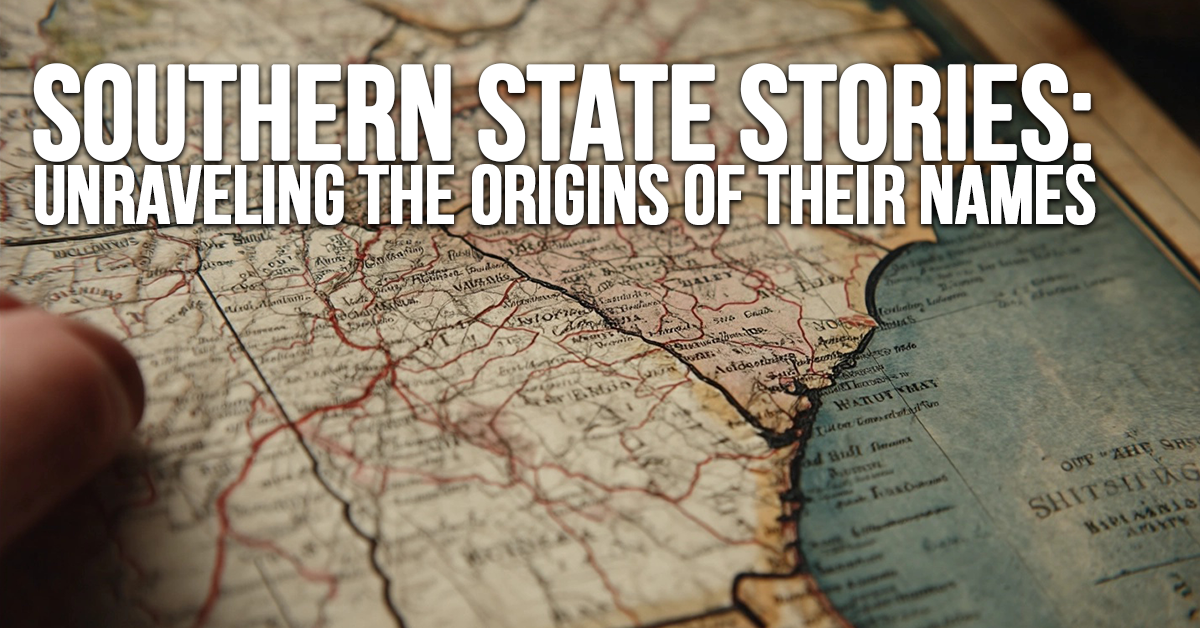
Southern State Stories: Unraveling the Origins of Their Names
Ever wondered about the origins of the state names we use every day? While some might seem straightforward, many have rich and intriguing histories, often rooted in European exploration, Native American languages, or significant historical figures. Today, we’ll delve into the stories behind the names of several Southern states, uncovering the fascinating narratives that shaped their identities.
Florida: A Floral Easter Celebration
Florida’s name is attributed to the Spanish explorer Ponce de León, who first landed on its shores in 1513. He named the region “Pascua Florida,” meaning “Feast of Flowers,” in honor of the Spanish Easter celebration. It seems the original “Florida Man” was also the first spring breaker.
Alabama: A Land of Herbs and Vegetation
The name “Alabama” is believed to derive from two Choctaw Indian words, “Alba” and “Amo,” which together translate to “gatherer or picker of herbs and vegetation.” Today, the name might be more associated with football legends Bear Bryant and Nick Saban.
Georgia: Honoring a British King
Georgia, the southernmost of the original 13 colonies, was named after King George II of Great Britain. The original colony’s territory was vast, stretching from Spanish Florida to West Louisiana. With four consecutive King Georges from 1704 to 1830, the specific king honored remains somewhat ambiguous.
North Carolina: A French Connection
North and South Carolina were initially a single colony until 1729, nearly 50 years before the Revolutionary War. The colony was named in honor of Charles IX of France. The name originates from the Latin word “Carolinus,” derived from “Carolus,” which translates to Charles.
South Carolina: Sharing a Royal Heritage
As mentioned above, South Carolina shares its name origin with North Carolina, both paying homage to Charles IX of France.
Louisiana: A Tribute to the French Monarchy
Louisiana was named in honor of French King Louis XIV. While the popular image of Louis XIV partying on Bourbon Street is a humorous exaggeration, the state’s name reflects its French colonial heritage.
Virginia: The Virgin Queen’s Legacy
Virginia’s name honors British Queen Elizabeth I, known as “The Virgin Queen.” The name was bestowed by Sir Walter Raleigh, who explored the region around 1584, with permission granted by the queen herself.
Tennessee: A River and a Cherokee Capital
Tennessee’s name originates from the Cherokee words “Tanasi,” a river name, and “Tenassee,” the capital of the Cherokee nation. The state’s moniker reflects its rich Native American heritage.
Kentucky: A Land of Many Meanings
Kentucky’s name is believed to derive from one or more Native American words, with interpretations ranging from “prairie” and “meadow” to “land of tomorrow” and “river bottom.” Kentucky became the 15th state to join the Union. Its capital, Frankfort, was chosen after pledging more manpower for the construction of the capital building.
Mississippi: Named After the Mighty River
Contrary to a common misconception, Mississippi was not named by a child struggling with spelling. It was simply named after the Mississippi River, a dominant feature of the region.
Beyond State Names: Assessing Your Insurance Coverage
Just as understanding the origins of state names provides valuable insights into history, reviewing your insurance coverage is essential for ensuring your protection. Are you paying too much? Are you adequately covered? Contact an independent insurance agent for a free, no-obligation quote and policy review.
Conclusion:
The names of Southern states, like those of all states, are woven into the fabric of American history. From European royalty to Native American languages, these names tell stories of exploration, colonization, and cultural heritage. By understanding the origins of these names, we gain a deeper appreciation for the rich tapestry of our nation’s past.
Disclaimer: This article provides general information and should not be considered professional historical or insurance advice.